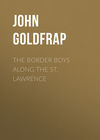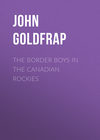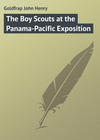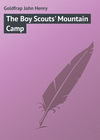Kitabı oku: «The Bungalow Boys North of Fifty-Three», sayfa 6
CHAPTER XVIII – TOM PLAYS DETECTIVE
While the others were getting things in readiness for resuming the march the next day Tom began an investigation. He had at first thought that the mysterious noises of the night had been caused by their old enemy, but some reflection made him believe that he was mistaken.
In the first place the thief, having had the good fortune to have his trail wiped out by the snow, was not likely to be foolish enough to come back and leave a fresh one. In the second, he was probably aware that his first attempt had failed to scare the boys off his track. At any rate, his continued haste along the trail appeared to conduce to such a belief.
Tom had noticed that the white object which swooped down on old Joe, scaring him almost into a fit, was a big white owl, in all probability bewildered and blinded by the fire glow. He had observed, also, that the mysterious noises appeared to come from the old hut, and the strange “booming” sounds, as nearly as he could make out, had also emanated from the same quarter.
The hut, then, appeared to be the logical place in which to look for the origin of the series of happenings that had so alarmed the venerable and superstitious Joe Picquet.
The first thing that Tom noticed when he entered the hut was something white lying on the hearthstone of the chimney. On closer inspection this proved to be the body of an Arctic hare. It was badly mangled and torn, as if something had been eating it. Tom stooped and peered up the chimney.
“Who-oo-oo-oo!” he shouted, at the same time beating the sides of the smoke shaft with a stick that he had selected from a pile of firewood laid in by the former occupant of the ruined hut.
His voice rang up the chimney like the noise of a train in a tunnel. At the same instant there came a thunderous booming sound and the rush and roar of wings. Tom had just time to dodge back before there came flopping and scratching and squeaking down the chimney the body of a huge white owl.
Tom fell upon it, but before he could secure the bird it had dug into his arm with beak and talons, and then, with a weird shriek, blundered across the hut and out through an unglazed window into the open air.
“Gone!” exclaimed Tom as he saw this. “And,” regretfully, “it would have made a bully trophy stuffed, too. However, the mystery of the Flying Wolves is explained. That booming sound was made by the flapping of the owl’s wings in the wide chimney as it flew down there with that white hare it had caught. I’ve heard that chimney swallows make the same booming in chimneys at home as they enter and leave their nests.
“As for the screams and shrieks, the cries of that poor hare explains that easily enough. Naturally, they sounded louder and as if they were up in the air, proceeding as they did from the top of the chimney. The rest of the mystery must be laid to old Joe’s imagination, which appears to be in first-class working order.”
Tom couldn’t help giving mischievous glances at Joe as, over their breakfast, he told the others the result of his investigations. But the old man’s face was scornful as Tom proceeded. When the boy had concluded, Joe, who had patiently heard him out, had his say. It was brief and to the point.
“You only theenk. Joe Picquet know. Many men know ’bout Loups Galoups – c’est sufficient.”
Tom saw that the old man was not in the least convinced that the noises were not of supernatural origin. So hard is it to shake superstitious beliefs, especially in the case of a man like old Joe, who had been born and brought up in the wilds, and who rarely came into contact with cities or life as it was beyond the wilderness.
They came to Otter Lake a few hours after their early start. On the banks of the lake they found a party consisting of two families of Indians. They were having a sort of carouse. The bucks had had the good fortune to kill three deer the day before. As is the custom with the Indians, the occasion was being observed by a celebration.
The Indians would not move on again till all the meat had been eaten or wasted. They greeted the newcomers with unusual cordiality, and the squaws threw big lumps of raw meat to the dogs, which the mamelukes gulped down in great swallows and then yapped and barked for more.
They insisted on the party halting to eat with them and partake of the unaccustomed plenty of the camp. This Joe was the more willing to do as he guessed that from the Indians he might get some news of the fugitive. But in their present mood the Indians were giving all their time to jollity of a decidedly rough character, and Joe knew better than to offend them by talking business until the time was ripe.
While they waited to eat, the squaws bustled about collecting wood. The boys hated to see women thus employed, but they knew that they dare not offer to do it; so they sat silent while old Joe and the Indians smoked and talked. The Indians were telling of the great hunt of the three deer, enlarging, as is their custom, every little detail till the story stretched out to endless lengths.
Then they discussed dogs, a topic of endless interest in the North, where dogs are infinitely more valuable than horses, and where oftentimes a life, or many lives, may depend on their gameness and reliability. This topic exhausted, they turned to the weather.
In a land where so much depends upon its moods, the weather is a subject of vital interest. The Indians told of the big snows they had seen, and old Joe Picquet related his similar experiences, and so the chat ran along till the squaws announced that everything was ready for them to eat.
They sat about the fire in the drafty tepee, eating off bits of birch bark. That is, the white men did. The Indians used their fingers. At last the meal was finished, pipes lighted, and old Joe felt at liberty to ask the questions he was dying to put.
At first the Indians shook their heads. They had seen no white man. But then one of the squaws interjected a remark. Wild Bird, another of the squaws, had seen that very morning, while gathering wood to the north, the trail of a sled. She had examined it and had found by it an odd object. She had brought that object into camp. Would she produce it? She would.
From a corner of the tepee the squaw shyly produced her find. The boys could have uttered a cry of joy as they saw what it was.
The fag end of a yellow cigarette! Assuredly, then, the trail Wild Bird had seen was that of the fugitive. It began about two miles to the north by a tall “Rampick” (dead tree), near which he had camped, judging by the remains of a fire, and from which he had hacked off some dead limbs. And then Wild Bird herself gave another bit of evidence to clinch the identification. She had remarked the man’s funny snowshoes. Never had she seen any like them.
“Boosh! Mes garçons! We have found zee trail once more! Bien!”
Old Joe’s face beamed. But although they were anxious to hurry on, they could not leave the friendly Indians hastily without a severe breach of etiquette. But at length the social code of the tribe was satisfied, and, with well-fed dogs in the traces, they got under way once more. Wild Bird and another Indian went with them part of the way, so as to be sure that they would not miss the spot at which they were to pick up the trail.
At last they reached the gaunt “Rampick,” good-byes were said, and they had the satisfaction once more of following the two familiar parallel lines in the snow and beside them the tracks of the odd-shaped snowshoes. The sky was gloomy and gray, but the Indians had said there would be no more snow.
They journeyed on through a melancholy land all that afternoon. That fall there had been a forest fire, and the blackened stumps of the trees that had not fallen stood out, etched in ebony black, against the dreary gray sky.
It was a pensive and melancholy land. But through it all, to brighten the trail like a streak of vivid scarlet, was the track of the sled, the sled on which reposed the stolen black fox skin. And beside it, as if to assure them they were on the right track, lay at intervals little yellow-wrapped rolls of tobacco.
“Zee time ees not long now,” declared old Joe, when they camped that night on the edge of a gloomy little lake tucked away between two rocky ridges.
CHAPTER XIX – OLD JOE’S THREAT
The following morning, when they rose, the sky was cloudless. The night before the stars had shone like diamond pin points in the sky. The Northern Lights had whirled in a mad dance of shimmering radiance.
Beyond the camp stretched the white smoothness of the frozen river leading from the sad little lake. The heaped masses of piled mountains showed to the north and west, savage boundaries, bristling with defiance toward the intruders into a frozen world.
The morning was very cold and very still. It was that brooding stillness that hangs over the land of the frost-bitten suns and seems to convey a sense of something alert with enmity to mankind, hovering like a sinister cloud over the frozen snow fields. But of all this, although keen enough to such impressions at other times, the boys noticed little as they bustled about preparing for the day’s work.
It was reasonably certain now that before very long they must catch up with the thief. The dogs were fed with deer meat purchased in exchange for tobacco from the friendly Indians of the day before. The boiling hot tea and the fried cakes and deer meat put new heart into the adventurers. As for the dogs, they frisked and capered in the snow with unaccustomed playfulness after their full meal, till old Joe summoned them to the harness. Then they resumed the hang-dog air of the mameluke, which is an odd sort of blend, suggesting obstinacy and defiance and cringing servility.
Tom noticed that old Joe carefully oiled the lock of his old squirrel rifle before they started. On the benevolent face of the old man there was a new expression. It partook almost of ferocity, and Tom began to fear that in the event of their coming up with the thief they might have some difficulty in restraining the old man from violence.
As he oiled his rifle and caressed the aged weapon lovingly the boys noticed that the old trapper was humming to himself.
“You seem happy,” said Tom, as the old man knocked the ashes out of his pipe and tightened the thongs of his snowshoes, straightening up again with a grunt.
“Eh bien! I am happy. To-day I teenk the owl catch the weasel, mon enfant. Boosh! Let us be going.”
The whip cracked, the dogs yapped, the harness creaked as it tightened under the stout pull of the meat-stuffed mamelukes, and the little cavalcade dashed forward. Once more they were remorselessly upon the trail of the thief; but to-day there was a difference in their bearing. By some intuition which he would have been at a loss to explain, Tom felt that the morning’s start was the beginning of the end. Before night, if fortune favored them, they would come face to face with the man to whose track they had clung for so long.
Old Joe capered about like a boy. He sang snatches of wild French-Canadian boat songs, he snapped his fingers, and once he cut from the trail-side a thick branch, which he trimmed down like a walking-stick and then swung like a cudgel. The boys guessed that in imagination he was bestowing a sound beating upon the thief.
But Tom had resolved that there must be no work of that sort when they came up with the man, if they ever did. It was plain to see that old Joe was prepared to carry out to the letter the law of “an eye for an eye,” the only law that woodsmen North of Fifty-three know or care much about. He did not blame old Joe for his desire to bestow at least a good beating on the thief, considering the old trapper’s surroundings for many years; but he did determine firmly that there was to be nothing of the sort that old Joe too evidently contemplated.
At noon that day they overhauled the ashes of the thief’s cooking fire. They were still warm. Old Joe’s saint-like face grew grimmer than ever. His white whiskers fairly bristled.
“We are not far behind heem now, mes amis,” he chuckled. “Boosh! Before long we shall see what we will see.”
Tom was wise enough to make no comments then. Time enough for that when they came up with the man. For the present he allowed old Joe to indulge himself in all sorts of sanguinary threats. Their midday meal was despatched with what haste may be imagined. Then the dogs were urged forward at a still brisker pace than they had followed during the morning. The snowshoes flew creakingly over the hard snow.
The boys found their minds busy with conjectures as they forged forward. What manner of man was this they were overhauling? Was he some ruffian of the wilds who would put up a stiff fight that might necessitate the use of firearms in self-defense, or would he yield to the superior force opposed to him and give up peacefully his ill-gained spoils?
As the day waned and the west began to crimson, Tom decided to speak his mind out to old Joe.
“See here, Joe, what do you mean to do when we catch up with this fellow?”
“Eh? Dat man? Why, make him geev up the skeens, of course.”
“But if he won’t? If he opposes us?”
“In dat case – ”
Joe said no more but patted the stock of his old squirrel rifle with a gesture that spoke volumes.
“No, we can’t have any of that sort of thing,” said Tom decisively. “If he won’t give up the skins without making trouble, we shall have to make him prisoner somehow and one of us stand guard over him while the others get some of the authorities.”
Old Joe shrugged his shoulders and looked at Tom with inexpressible astonishment. He couldn’t make out this at all. In his rough creed offenders against the code of the woods must be summarily dealt with. Rifle or rope, it was all one to him, but the idea of calling in outside forces to aid him had never entered the rough old woodsman’s head.
“Zee police?” he inquired. “You want call zee police, or zee sheriff? Pourquoi? You leave heem to me. Old Joe Picquet feex heem – bien.”
He raised his old rifle to his shoulder and squinted down the sights as if to make sure that everything was in perfect order.
CHAPTER XX – THE END OF THE TRAIL
It was about four o’clock when, from a thick clump of young balsam trees about a hundred yards ahead of our party, there came the sharp barking of dogs. The boys thrilled. At last the big moment had arrived; the end of their pursuit was at hand. There could be no doubt that the camp they had come upon was the camp of the thief.
If any doubt remained it was speedily removed by the sight of the roof of a small tent standing amid the dark green trees. It was a white man’s tent of the wall type, a variety that an Indian would scorn to use. From the top of it stuck a small stove-pipe, an unwonted sight in wilderness travel. A stream of smoke coming from the pipe showed that the tent was occupied.
From the camp the four dogs who had heralded the arrival of the boys and their old guide came prancing and snuffing, their tails curled and teeth shown in a snarl. But from the tent itself, beyond the smoke that curled up from the stovepipe, there came no sign of life.
They halted and held a council of war.
“Let’s go right up to the tent and demand the man to surrender to us,” suggested Jack.
But old Joe negatived this with a shake of the head.
“He is ver’ bad man,” said he, “maybe so he hide in the trees and shoot. Moost be ver’ careful.”
“He may be peering out at us now,” breathed Tom, glancing about him uneasily.
“Oui; maybe so he have us covered weez hees rifle at dees moment,” agreed old Joe, without the flicker of an eyelash. With amazing coolness he squatted down and filled his pipe.
“Moost hav’ smoke to teenk,” he explained.
For some seconds, while the boys were in an agony of suspense and the strange dogs stood with bristling hackles and snarling teeth at a respectful distance from old Joe’s team, the veteran of the northern wilds drew placidly at his old brier. To look at him no one would have imagined that the venerable-looking old man was revolving in his mind the capture of a desperate rascal, who even at that moment might have him covered from some point of vantage.
The suspense was a cruel test of the boys’ nerves. Remember that they were out in the open, affording an easy mark for anyone lurking within the shadows of the dark balsams that screened the tent with its smoking stove-pipe. For all they knew, in fact, the man might not be alone. He might be one of a gang regularly organized to raid traps and skin stores. Such organizations were not rare in that part of the country, as the boys well knew.
At length old Joe rose, knocked the ashes out of his pipe, and faced the boys. They knew that he had at last decided upon a plan. It was a simple one. The wonder was that he had taken so long to arrive at a conclusion.
“I am going to call out to dees man,” said Joe. “I tell heem if he ees fool he will fight us; if he ees wise man he weel do what we say.”
Before they could stop him the old man had stepped forward, using the trunk of a balsam tree as a shield between himself and the door of the tent. A minute later someone stirred within the tent; then came a voice:
“Who’s there?”
Joe gave a little laugh.
“Someone to see you,” he said. “I ask you, please shove outside any weapon you have weez you. It ees no good for you to fight. We have caught you at last.”
There was a silence inside the tent. Then the boys saw the flap raised and a rifle thrust out. Old Joe’s face beamed. This was going to be easier than he had imagined. He beckoned to the boys, and, as they joined him, he flung open the flap and stepped inside the tent.
Stretched out on the ground right across the doorway was a small, wizened looking man covered with a shabby blanket made of mangy-looking skins. His head and shoulders were propped up on a couple of filled packs.
Even in the dim light within the tent it could be seen that his cheeks were drawn and gray and that pain had etched lines of suffering on them. The boys stood amazed just at old Joe’s elbow.
Was it possible that this little gray man with the look of pain on his face was the robber whom they had pictured during the long days and nights of the pursuit as a savage, truculent fellow ready to give them a fight rather than yield up the stolen skins? They actually felt pity as they looked at the little wasted form on the ground.
As for Joe, he appeared to be equally dumfounded, but he soon recovered his faculties.
“And so, mon ami, we have found you at zee last, eh?”
“Real pleased you come, too! Real pleased,” was the answer the little gray man gave in a high, piping treble.
The boys took in the details of the tent. The small sheet-iron stove with its pipe going through the roof, the queer-looking snowshoes, and the pile of duffle left in a corner just as it had been thrown from the sled. Old Joe looked more taken aback than ever. He had come prepared to fight some rascal who would put up a desperate resistance. Instead, he found a little wasted man who had nothing to say but that he was glad to see them.
There was a pause while Joe reconstructed things. It was broken in upon by another piping up of the thin voice of the man on the ground.
“See that sack over thar, stranger?” said the little man, indicating a partially filled pack-bag in one corner of the tent.
“Oui! I see heem,” rejoined Joe in a dazed voice.
“Wa’al, thar’s fish in thar. I’d take it real kind in yer ef yer’d jes’ feed my dorgs, mister. They ain’t hed much ter sot their teeth in lately, me being hurried like along the trail.”
The boys exchanged glances. They had met with many strange experiences, but this appeared to be the cap-sheaf of them all. Old Joe simply shrugged his shoulders; he was bereft of speech. In the face of this astonishing end to their long, grim chase, he was, for the time being, incapable of finding words.
He crossed over to the sack and began pulling out fish, but in the midst of the operation he found his voice again.
“Say, you, what’s zee matter weez you, anyhow?”
“I’m sick,” responded the man under the shabby blanket, “right sick.”
“I see you seeck, all right,” said Joe, “but what ails you? Boosh!” he concluded, puffing out his sun-burned cheeks.
“I don’t rightly know,” rejoined the other; “it’s a sorter pain all over.”
He moved uneasily under the shabby blanket and the boys saw his hands, which lay outside the covering, clench and unclench, as if he were suffering a sudden spasm of pain.
Outside the tent there came a sound of plaintive yapping and howling. The little man’s mamelukes had smelled the fish.
“Reckon they’re hungry, poor beasts,” said the little man.
Joe did not reply, but moved to the door of the tent. He threw out the fish. The dogs sprang upon it ravenously, tearing it as if they had fasted for days. Joe watched them for a minute with an odd look on his bearded face. Then he turned to the man again.
“What your name, anyhow?”
“Dolittle – Peabody Dolittle,” said the man, “but somehow folks mostly call me Pod.”
Pod! The boys, despite the situation, could almost have laughed at the name.
Here was a bold thief who, by all the rules of fiction, should have borne some name that would fit with his supposedly desperate character, and instead of that he told them that he was “mostly called Pod.”
As for Joe, he could only gasp and shrug his shoulders helplessly.
“Boosh!” he exclaimed after an interval. “Pod, you an’ me and dese garçon got to have some talk, Pod.”
“Go right ahead, mister,” said Pod.










